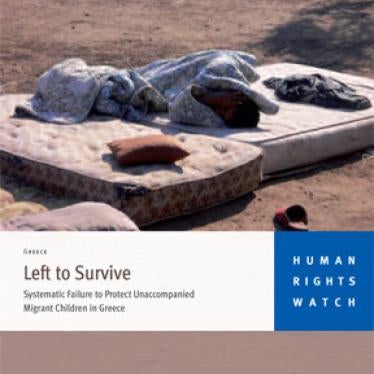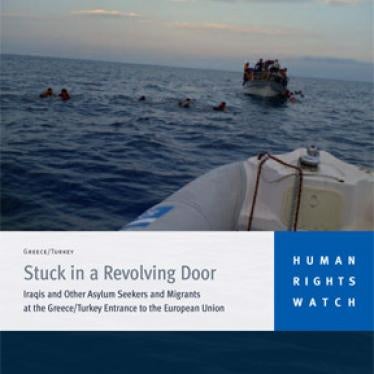Greek authorities are arresting large numbers of migrants and asylum seekers in the country's cities and islands and moving many of them to the north, raising fears of illegal expulsions to Turkey, Human Rights Watch said today.
Human Rights Watch received reports from a credible source that, in mid-July 2009, police transferred a group of Arabic-speaking people from Chios Island to the Evros border region, where they were secretly forced to cross the border into Turkey. On July 23, local human rights activists prevented authorities from transferring 63 migrants from Lesvos Island to the north by blocking access to the ferry. On July 25, the police took most of them to Athens under heavy police escort.
"These operations and transfers are very worrying," said Bill Frelick, refugee policy director at Human Rights Watch. "We fear that people are being prevented from seeking asylum, that children arriving alone are not being protected, and that migrants are kept in unacceptable detention conditions and possibly even being secretly expelled to Turkey."
In another recent episode, in a large-scale police operation from July 16 to 18, police in Athens surrounded what appeared to be several hundred migrants and locked them inside an abandoned courthouse. The police arrested anyone who left the building. It is feared that some of them may have needed protection and did not have a chance to file a claim for asylum, the police prevented Human Rights Watch from speaking to the people held inside, and Human Rights Watch does not know the whereabouts of those who were arrested when they tried to leave.
In a November 2008 report, "Stuck in a Revolving Door: Iraqis and Other Asylum Seekers and Migrants at the Greece/Turkey Entrance to the European Union," Human Rights Watch documented how Greek authorities have systematically expelled migrants illegally across the Greece-Turkey border, in violation of many international legal obligations. These "pushbacks" typically occur at night from detention facilities in the northern part of the country, close to the Turkish border, and they involve considerable logistical preparation. Human Rights Watch at that time interviewed 41 asylum seekers and refugees - all privately and confidentially - in various locations in both Greece and Turkey, who gave consistent accounts of Greek authorities taking them to the Evros River at night and then forcing them across.
Human Rights Watch also documented how Greek authorities miscategorize unaccompanied children as adults and detain them for prolonged periods of time in conditions that could be considered inhumane and degrading. (See the December 2008 report, "Left to Survive: Systematic Failure to Protect Unaccompanied Migrant Children in Greece.")
In yet another recent incident, on July 12, police destroyed a makeshift migrant camp in Patras, on the Peloponnese peninsula. In the days before the camp was destroyed, the police reportedly arrested large numbers of migrants there, and according to credible sources, transferred an unknown number to the northern part of the country. On July 17, Human Rights Watch met with several Afghans in Patras, including 12 unaccompanied migrant children now homeless as a result of this operation, who were in hiding in abysmal conditions out of fear of being arrested.
A 24-year-old man told Human Rights Watch: "We're living like animals in the jungle ... we can't take a shower and we don't have proper food ... before I lived in the camp, but all of my things and clothes were burned. Now I have a shirt and a pair of pants, nothing else."
A 14-year-old Afghan boy who arrived in Greece one year earlier said: "The worst situation during the past year is now, in Patras - now that I'm living in this forest .... There's not enough food and we only eat bread with water."
Human Rights Watch also observed on July 17 how more than 1,000 migrants lined up all night, largely in vain, trying to file asylum applications at Athens' main police station. Greece recognizes as few as 0.05 percent of asylum seekers as refugees at their first interview and passed a law at the end of June that abolishes a meaningful appeals procedure, making it virtually impossible for anyone to obtain refugee status. It also extended the maximum length of administrative detention for migrants to 12 months - and under certain circumstances, up to 18 months - from previously 90 days.
"It appears Greece is doing everything it can to close the door on persons who seek protection in Europe, no matter how vulnerable they are," said Frelick. "The European Union must hold Greece accountable for acts contrary to international and European human rights and refugee law, and it needs to act fast, as the lives of many are at risk."








